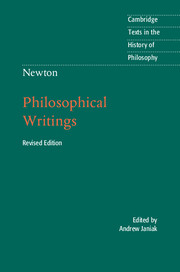Book contents
- Frontmatter
- Contents
- Acknowledgments
- Introduction
- Chronology
- Further reading
- Note on texts and translations
- I “New Theory about Light and Colours”
- II Correspondence with Robert Boyle [1679]
- III De Gravitatione [date unknown]
- IV The Principia [1687, first edition]
- V “An Account of the System of the World”
- VI Correspondence with Richard Bentley [1691–3]
- VII Correspondence with G. W. Leibniz [1693/1712]
- VIII Correspondence with Roger Cotes [1713]
- IX An Account of the Book Entitled Commercium Epistolicum [1715]
- X Queries to the Opticks [1721]
- Index
V - “An Account of the System of the World”
Published online by Cambridge University Press: 05 August 2014
- Frontmatter
- Contents
- Acknowledgments
- Introduction
- Chronology
- Further reading
- Note on texts and translations
- I “New Theory about Light and Colours”
- II Correspondence with Robert Boyle [1679]
- III De Gravitatione [date unknown]
- IV The Principia [1687, first edition]
- V “An Account of the System of the World”
- VI Correspondence with Richard Bentley [1691–3]
- VII Correspondence with G. W. Leibniz [1693/1712]
- VIII Correspondence with Roger Cotes [1713]
- IX An Account of the Book Entitled Commercium Epistolicum [1715]
- X Queries to the Opticks [1721]
- Index
Summary
Scripture abused to prove the immoveableness of the globe of the earth
In determining the true system of the world the main question is whether the earth do rest or be moved. For deciding this some bring texts of scripture, but in my opinion misinterpreted, the scriptures speaking not in the language of astronomers (as they think) but in that of the common people to whom they were written. So where ’tis said that God hath made the round world so fast that it cannot be moved, the prophet intended not to teach mathematicians the spherical figure and immoveableness of the whole earth and sea in the heavens but to tell the vulgar in their own dialect that God had made the great continent of Asia, Europe and Africa so fast upon its foundations in the great ocean that it cannot be moved therein after the manner of a floating island. For this continent was the whole habitable world anciently known and by the ancient eastern nations was accounted round or circular, as was also the sea encompassing it. And this earth and sea they accounted flat as if the sun, moon and stars ascended out of the ocean at their rising and went down into it again at their setting. This continent is the world or earth usually mentioned in scripture and there described to be broad and to have end or borders, that is circular ones, whose centre some placed in Egypt others at Delphos, others at Jerusalem. And this world the prophets consider as established in the ocean upon sure and immoveable foundations at the first creation. The heavens were of old and the earth standing out of the water and in the water (that is in the midst of the ocean like an island) by the word of God (2 Pet. 3.5.). Thou Lord in the beginning hast laid the foundations of the earth and the heavens are the work of thine hands (Psalms 102.25, Proverbs 8.29). Where wast thou when I laid the foundations of the earth. Declare if thou hast understanding who hath laid the measures thereof or who hath stretched the line over it. Whereupon are the foundations thereof fixed or who hath laid the corner stone thereof, when the stars of the morning praised me together, etc. (Job 38.4).
- Type
- Chapter
- Information
- Newton: Philosophical Writings , pp. 115 - 118Publisher: Cambridge University PressPrint publication year: 2014



